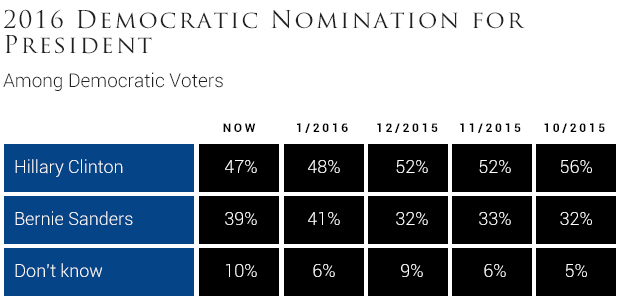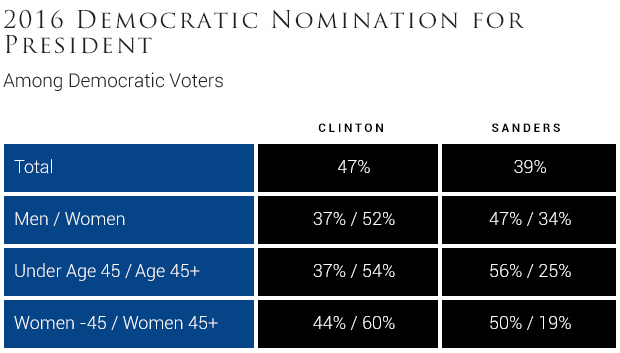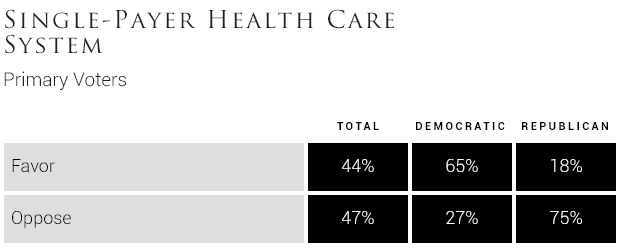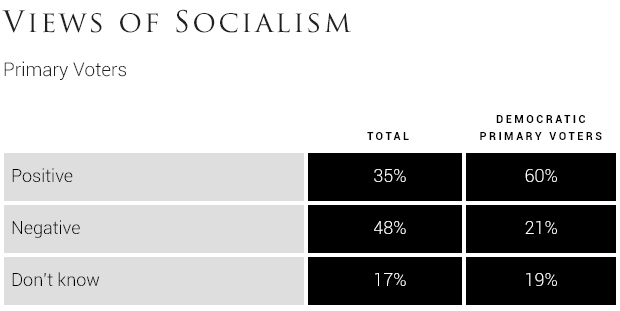CBS News national poll: Hillary Clinton holds lead over Bernie Sanders
By Anthony Salvanto, Fred Backus, Jennifer De Pinto, Sarah Dutton
After a narrow win for Hillary Clinton in Iowa and a decisive victory for Bernie Sanders in New Hampshire, Clinton now leads Sanders by eight points nationally. Ten percent are undecided. Her lead is similar to what it was last month, but it has been cut in half since December.
Clinton leads among women and voters over age 45, while Sanders leads with men and gets strong support from younger voters. Clinton has a large advantage with older women voters; but Sanders has an edge with women under age 45.
The candidates will soon face off in South Carolina's primary, where in 2008, more than half of the Democratic electorate was African American. Nationally, Clinton has a 30-point advantage among black Democratic primary voters, while white voters are split in their support.
Self-identified Democrats go strongly for Clinton, while independents who say they will vote in a Democratic primary are overwhelmingly in Sanders' camp.
With voting in primaries and caucuses underway, two-thirds of Democratic primary voters now say their minds are made up, up from 56 percent in January. Still, a third says they could still change their minds.
Support for both Clinton and Sanders has solidified, particularly for Sanders; 67 percent of his voters now say their minds are made up (even with Clinton), an increase of 16 points since January.
- Civil rights leaders praise Hillary Clinton's familiarity with their concerns
- After New Hampshire win, Bernie Sanders meets with Al Sharpton
Overall, nearly nine in 10 Democratic primary voters say they would support Hillary Clinton should she become the Democratic nominee. And while most of those who support Sanders would back Clinton, 21 percent say they would not support Clinton if she is the party's nominee.
Similarly, most Democratic primary voters would support Bernie Sanders if he wins the nomination. Among Clinton's supporters, just 14 percent would not support Sanders.
The Democrats: Electability, getting things done, and the Supreme Court
Electability continues to be a strength for Clinton. She is still viewed by a wide margin as having the best chance to win the general election, but Sanders has narrowed the gap on this measure. In November, before the start of the nominating contests, just 18 percent said Sanders had the best chance to win a general election, but that number has risen to 35 percent.
Clinton also has an advantage on getting things done: Far more -- 59 percent -- see her as the candidate most likely to get things done in Washington, compared to 33 percent for Sanders.
The passing of U.S. Supreme Court Justice Antonin Scalia leaves a vacancy on the Supreme Court, and it's unclear now whether he will be replaced before or after the presidential election. Forty-eight percent of Democratic primary voters trust Clinton most to appoint justices to the Supreme Court, while 42 percent trust Sanders most.
There is some division within the Democratic primary electorate about whether they want a political insider or outsider. Fifty-two percent want the next president to shake up the political system, while 45 percent want him or her to work within the political system. Republican primary voters are far more likely to seek someone who will shake things up.
Sanders (52 percent) is the preferred candidate of those who want someone to shake up the political system, while Clinton (60 percent) is the choice of those who prefer someone who will work within the system.
The Democrats: Candidate characteristics
Most Democratic primary voters view both Clinton and Sanders as honest and trustworthy, but the gap between the two has grown. Seventy-seven percent say Sanders is honest, compared to 60 percent who say that about Clinton. They were even on this measure in the fall.
But more view Clinton as having policies that are achievable. Eighty-one percent think Clinton's policy proposals are realistic, compared to just 51 percent who say that about Sanders' proposals. Four in 10 Democratic primary voters call Sanders' proposals unrealistic.
More than six in 10 Democratic primary voters say the Democratic candidates' positions on the issues are about right. A quarter view Clinton's issue positions as not liberal enough (that rises to 50 percent among Sanders' supporters). Slightly fewer - 18 percent- think Sanders' positions are too liberal.
Majorities of Democratic primary voters think both Clinton and Sanders understand their needs and problems. But there are some differences when it comes to specific voter subgroups. More African Americans think Clinton (80 percent) understands their needs and problems than think that about Sanders (55 percent). Younger voters are more inclined to think Sanders (80 percent) understands them than Clinton (60 percent). While similar majorities of women say each of the candidates understands their problems, younger women are more likely to think Sanders does, while older women think Clinton does.
Democratic primary voters pick being honest and trustworthy (33 percent) as the most important candidate quality in their vote for the nomination, followed by caring about people like themselves (29 percent) and experience (28 percent).
Honesty is the top priority among Sanders voters (50 percent) -- a trait that has been a greater weakness for Clinton. Forty-four percent of Clinton supporters choose experience as the most important candidate quality.
The Democrats: Race, Wall Street and Commander-in-Chief
Democratic voters nationwide express confidence in both Clinton and Sanders on their ability to handle race relations and racial inequality, but African Americans are more likely to be very confident in Clinton (57 percent) than Sanders (24 percent).
Clinton continues to hold an advantage over Sanders on being an effective commander in chief. Far more are very confident in Clinton than Sanders on this measure.
Throughout the campaign, Sanders has been criticizing Clinton for her ties to Wall Street -- and that may be resonating. In this poll, more Democrats are very confident in Sanders' ability to regulate banks and financial institutions than they are in Clinton's.
Single-Payer Health Care and Socialism
One of Sanders' key proposals is a single-payer health care system. The American public overall is divided on this proposal, but most Democratic primary voters support it.
While Americans are more likely to have a negative view of socialism than a positive one, most Democratic primary voters are not bothered by the socialism label. Sixty percent view it positively, including 53 percent of Clinton's supporters and 71 percent of Sanders' backers.
Clinton's Email Controversy
Seventy-three percent of voters nationwide continue to say it was not appropriate for Hillary Clinton to use a private email address and server for her work as Secretary of State. Even a slim majority of Democrats -- 52 percent -- think it was not appropriate.
But 55 percent of voters nationwide say Clinton's use of a personal email and server does not affect their opinion of her (although four in 10 say it has become worse). Views are colored by partisanship: Most Democrats and more than half of independents say it hasn't had an impact, but a majority of Republicans -- 66 percent -- say their opinion of her has grown worse.
This poll was conducted by telephone February 12-16, 2016 among a random sample of 2,007 adults nationwide, including 1,674 registered voters. Data collection was conducted on behalf of CBS by SSRS of Media, PA. Phone numbers were dialed from samples of both standard land-line and cell phones.
The poll employed a random digit dial methodology. For the landline sample, a respondent was randomly selected from all adults in the household. For the cell sample, interviews were conducted with the person who answered the phone.
Interviews were conducted in English and Spanish using live interviewers.
The data have been weighted to reflect U.S. Census figures on demographic variables.
The error due to sampling for results based on the entire sample could be plus or minus two percentage points. The error for subgroups may be higher and is available by request. The margin of error includes the effects of standard weighting procedures which enlarge sampling error slightly.
The margin of error for the sample of 549 Democratic primary voters is 5 percentage points.
This poll release conforms to the Standards of Disclosure of the National Council on Public Polls.



